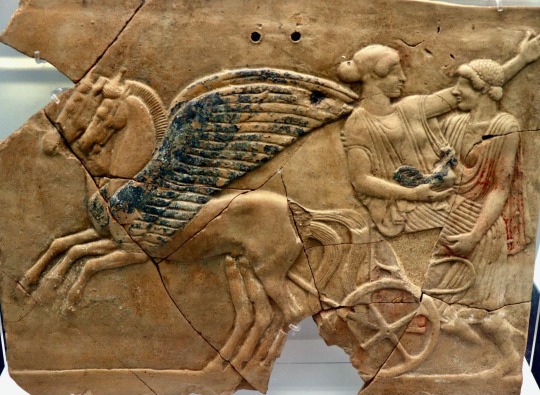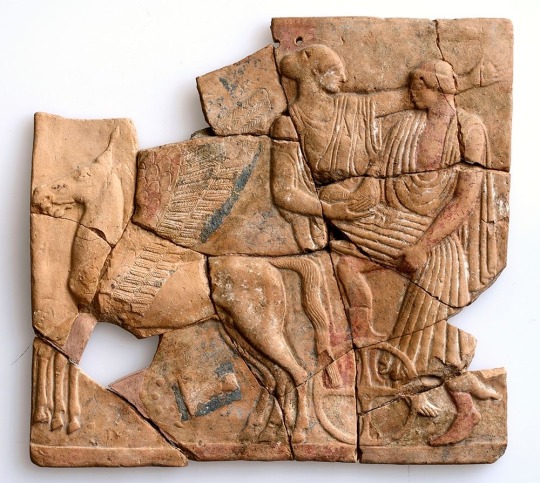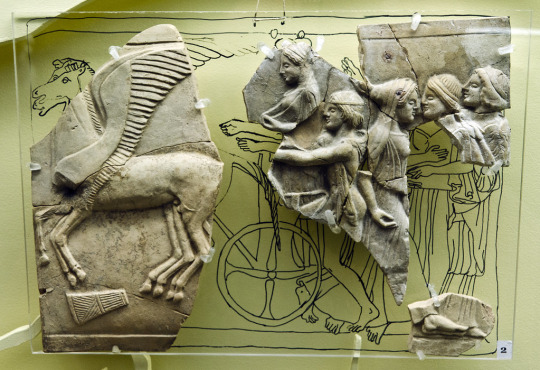Text
Casual reminder that "feminist" retellings of Persephone's myth that make their relationship quirky awkward Haides x Overprotected sheltered Persephone are in fact, not feminist.
The myth is already feminist.
142 notes
·
View notes
Text

18 notes
·
View notes
Text
One of the wonderful things about Hellenic polytheism is that it's an accessible spiritual path for people of all ages. As a teenager and now almost turning into a young adult, I can personally attest to this.
I first became fascinated by the Hellenic gods and goddesses when I was around 13 years old. The rich mythology, the diverse pantheon, and the idea of being able to actively worship these ancient deities really resonated with me. I dove headfirst into research, learning as much as I could about the history, traditions, and practices associated with Hellenism.
For a time, my interests shifted, and I stepped away from actively practicing Hellenism. But the pull of these ancient Greek traditions never truly left me. It wasn't until I was around 16 or 17 that I felt a renewed and more profound connection to the Hellenic deities. This time, my rekindled interest felt much more intentional and grounded.
Gradually, I began incorporating Hellenistic practices back into my life, finding a deep sense of fulfillment and spiritual enrichment in doing so. The accessibility of Hellenism has been truly remarkable - it welcomes individuals of all ages and backgrounds, from inquisitive teenagers to seasoned adults.
The key is to approach it with an open mind, a willingness to learn, and a deep respect for the rich history and traditions. Start by familiarizing yourself with the Greek pantheon, the myths, and the various festivals and rituals associated with Hellenism. As you feel drawn to certain deities or practices, gradually incorporate them into your daily life in a way that feels authentic and meaningful to you.
Remember, there is no "right" or "wrong" way to become a Hellenistic polytheist. It's a deeply personal and individualized path, and the most important thing is to find what resonates with you and to honor the gods in a way that is true to your own spiritual journey.
Whether you're a curious teenager, a young adult rediscovering your passions, or a seasoned individual seeking a deeper connection with the divine, the door to Hellenism is always open. Embrace your curiosity, trust your intuition, and know that it’s okay to take a step back whenever you feel pressured.
#hellenic deities#hellenic polythiest#devotees#deity worship#greek deities#deity#devotional#this is really long im sorry.#i love to yap
129 notes
·
View notes
Text
Whoever sent me 4 bees, PLEASE. I'm terrified of bees.
1 note
·
View note
Photo

Persephone
19th century
Christian Friedrich Tieck (1776–1851)
Plaster
** Visit my Links page for my other blogs & Facebook Pages
Keep reading
116 notes
·
View notes
Text

Leaf-nosed Bat ⋆ 𖥔 ݁ ˖
#gothic#spooky#bat photos#bats#cute bats#wildlife photography#goth photography#gothic photography#witchcore#witchblr
3K notes
·
View notes
Text
“What is the difference between a worshipper and a devotee?”
A Worshipper
A worshiper typically has a more casual relationship with their deities, compared to a devotee. A worshiper may pray or make offerings occasionally, but it is not their primary focus. This can be a good starting point for beginners who are just getting into spiritual practice, as it is less time-consuming than becoming a devotee.
A Devotee
A devotee prioritizes their worship and practice towards a particular deity or deities. A devotee will do everything a worshiper does, but more frequently and with greater dedication. This level of commitment requires more time and focus, which may not be ideal for beginners or those with very busy schedules.
Ultimately, the choice between being a worshiper or a devotee is a personal one. There is no universally "better" option, as it depends on an individual's spiritual needs, lifestyle, and level of experience. The key is to choose an approach that feels right for your current circumstances and goals.
#deity#hellenic deities#devotees#deity worship#hellenic worship#hellenic polythiest#greek deities#devotional#greek mythology
520 notes
·
View notes
Text
The consensual ‘abduction’ of Persephone in Lokri




Pinakes of Persephone driving the chariot or embracing Hades as he abducts her
A fun fact that I love about Persephone and Hades is that in the city of Lokri (Modern Italy), they were seen as the ideal marriage. Women who were about to get married re-interpreted the myth of the abduction of Persephone so it would reflect their current situation, e.g: Women who were happy with their future husband made a pinake (a tablet of painted wood or terracotta) where Persephone was driving the chariot and participating in her own ‘abduction’; On the contrary, women who were forced into their marriage would make a pinake where Persephone was fighting against her captor.
“The pinakes were most likely dedications made by young girls in the lead-up to their weddings. In this sense, it is understandable that the chosen god does not completely undergo the transition process. The dedications served the function of seeking Persephone's blessing and protection for their marriages, and they were dedicated before the marriage had taken place. So the image of the goddess that was being invoked and imitated in the abduction scenes was the goddess in the same state as the dedicating girls: the state immediately before marriage. […]
The most common pinax types are the 'divine' and 'imitation' scenes. In both cases, these range from unambiguous abductions where the maiden clearly struggles against her captor to images in which it appears the girl is complicit in her own kidnapping sometimes even taking charge of the chariot herself. The range can be accounted for because, as James Redfield points out, "no doubt some brides felt more abducted than others".”
- Mackin, Ellie. “Girls Playing Persephone (in Marriage and Death).” Mnemosyne 71, no. 2 (2018): 209–28.
#deity#hellenic deities#devotees#deity worship#greek deities#hellenic polythiest#persephone#devotional#greek mythology
3K notes
·
View notes
Text


whoop.
credits
#devotee and deity#deity#hellenic deities#deity worship#devotees#greek deities#hellenic polythiest#persephone
5 notes
·
View notes
Text
I've seen people talk about their conversations or experiences with their deities, and I wanted to make something very clear. You don't need to communicate to your deities. Do you think that people back then would just casually talk to the gods on a regular basis? No. They would go to their temples, pray, and give them offerings, and went along with their day hoping the gods heard them.
You don't need to overthink it. Go do some research, make an altar/shrine for whichever deity you want to devote to or worship. If you can't, you can always do some devotional acts. Go to a flea market or go to a mall, and when you look at something and think "Wow, that reminds me of [deity's name]" or "That's something I can totally see [deity's name] wearing," that's a devotional act.
Read their myths, stories, and even fictional shows or movies about them, even if they're depicted as evil or not. Read books or novels about them, good or bad. Pray to them for whatever reason, whether it's for protection or for anything else you can think of.
please don't ever pressure yourself on these sorts of things <3
#hope this makes sense#I was writing this in a hurry.#this was a little reassurance for me but also for beginners as well#deity#hellenic deities#deity worship#devotees#greek deities#hellenic polythiest#hellenic polytheism#devotional
51 notes
·
View notes
Text
"Would you peel an orange for me?"
I would peel a pomegranate for you.
69K notes
·
View notes
Text
aphrodite devotees have the best alter/shrines.
#aphrodite devotees are one of the most sweetest people ever omg.#yall r hot#deity#hellenic deities#devotees#hellenic polythiest#aphrodite#greek deities
11 notes
·
View notes
Text
⫘⫘⫘
intro
Hi, my name is Adriene. My pronouns are she/her. I'm 18 years old and have been a Hellenic Polytheist for a year now, devoting myself to Persephone.





I had always wanted to become a worshipper or devotee to Hades, as he gave off that fatherly, comforting, and protective vibe that I really admired (not right now anyway but hopefully in the future.) However, as time went on, I started receiving strange signs that I didn't think much of before but now consider. For example, I developed a sudden taste for pomegranates, an attraction towards Persephone, and heard more about her myth more often than before. I started doing research and found some websites which stated that she may have been giving me signs. Regardless, you can always reach out to deities on your own time.
DNI if you're homophobic, transphobic, sexist, racist, ableists, etc.
This blog is about my own thoughts or opinions on things regarding topics in the Hellenic polytheist communities, and some posts for beginners (much like myself) (Please do not believe in everything I say and do actual research.)
8 notes
·
View notes
Text
PSA: the Greek myths are not real. They are not real documentation of events. If you go into communication with deities only believing that they will be how they are in the mythology you're gonna be really surprised when Zeus shows up to tell you he's proud of you for graduating.
The myths were created to tell stories. You should take what happens in the myths with as much weight as you'd take what happened in Bible stories. These are myths that were never meant to be taken as the truth, written in a language that doesn't exist anymore, after being passed around orally in a language that doesn't exist anymore, in a time where words meant different things. The myths are not a good source for what a god is like or what they have done. Do not treat them like the Pinnacle of truth and do not belittle others for their preferred Greek myths.
1K notes
·
View notes
Text
normalize playing dti as a way to worship aphrodite and persephone.
#devotional#hellenic pagan#aphrodite#persephone#worshiping#dti#dress to impress#idk#deity worship#deity devotion
20 notes
·
View notes

